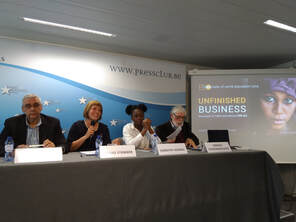 SWOP 2019 Launch Brussels
SWOP 2019 Launch Brussels UNFPA launched the State of the World Population 2019 in Brussels, May 7th, entitled ‘Unfinished Business. The pursuit of rights and choices for all’. Marking the 25th anniversary of the ICPD Programme of Action (PoA) as well as the 50th birthday of UNFPA itself, the report highlights the progress made, and the challenges ahead.
Belgium’s Directorate General for Development (DGD) Deputy Director Guy Rayée opened the launch, reminding everyone about the milestone the Cairo Programme of Action was. Tremendous progress has been made since, particular for women and their access to family planning.
Belgium’s Directorate General for Development (DGD) Deputy Director Guy Rayée opened the launch, reminding everyone about the milestone the Cairo Programme of Action was. Tremendous progress has been made since, particular for women and their access to family planning.
Mr Rayée testified how Belgium has been a long-time supporter of UNFPA’s work and has integrated UNFPA’s ideas in its work. It considers UNFPA a priority partner and this is translated in Belgium’s core support for the Population Fund, which was doubled over the past years and programme support for UNFPA Supplies.
Director of the UNFPA Brussels office Sietske Steneker emphasised the important shift, away from top-down population control to the advancement of people’s sexual and reproductive health and rights. Civil society stakeholders in particular have been the drivers of a human rights-based approach. The ICPD Programme of Action has helped to bring down the number of maternal deaths, the unmet need for contraception, the adolescent birth rate and the number of early marriages. However, huge challenges remain. That’s why UNFPA aims to achieve 3 zeros by 2030: zero maternal deaths, zero unmet need for family planning and zero harmful practices.
Ronald Schoenmaeckers, demographer, partcipated in the Cairo Conference in 1994. He recalled the fierce opposition to any language on the right to abortion. A weak compromise on safe abortion ‘where it is not against the law’ was the outcome, but abortion has continued to remain the main stumbling block in every subsequent commission.
Ronald Schoenmaeckers welcomed the progress in terms of access to family planning in Africa, which was only about 6% in 1994. However, he also emphasised that population growth remains part of the ‘unfinished business’, with the world population projected to grow to 11.2 billion by 2100, and the fastest growth to take place in Africa.
Jad Zeitouni, student, “Change-maker for SRHR” and Member of the Flemish Youth Council and Dorothy Adobea, student, Change-maker and HIV prevention worker brought in a youth perspective on the ‘unfinished business’ of the ICPD PoA, addressing challenges at home and abroad. Zeitouni emphasised the importance of comprehensive sexuality education, in which persistent gender norms should be addressed. Adobea reminded us about the need to tackle stigma and discrimination. Why do we still need to feel ashamed about our period? Why do people continue to fear being seen entering an HIV referal center? Both activists called on policy makers to take young people seriously. “More than half of world the population is younger than 25, yet they are not part of the debate, even when it comes to sexuality education. They are not allowed to talk from their own perspective”, Zeitouni stated. Adobea reminded us that whereas young people might lack experience, they are experienced in being young.
Director of the UNFPA Brussels office Sietske Steneker emphasised the important shift, away from top-down population control to the advancement of people’s sexual and reproductive health and rights. Civil society stakeholders in particular have been the drivers of a human rights-based approach. The ICPD Programme of Action has helped to bring down the number of maternal deaths, the unmet need for contraception, the adolescent birth rate and the number of early marriages. However, huge challenges remain. That’s why UNFPA aims to achieve 3 zeros by 2030: zero maternal deaths, zero unmet need for family planning and zero harmful practices.
Ronald Schoenmaeckers, demographer, partcipated in the Cairo Conference in 1994. He recalled the fierce opposition to any language on the right to abortion. A weak compromise on safe abortion ‘where it is not against the law’ was the outcome, but abortion has continued to remain the main stumbling block in every subsequent commission.
Ronald Schoenmaeckers welcomed the progress in terms of access to family planning in Africa, which was only about 6% in 1994. However, he also emphasised that population growth remains part of the ‘unfinished business’, with the world population projected to grow to 11.2 billion by 2100, and the fastest growth to take place in Africa.
Jad Zeitouni, student, “Change-maker for SRHR” and Member of the Flemish Youth Council and Dorothy Adobea, student, Change-maker and HIV prevention worker brought in a youth perspective on the ‘unfinished business’ of the ICPD PoA, addressing challenges at home and abroad. Zeitouni emphasised the importance of comprehensive sexuality education, in which persistent gender norms should be addressed. Adobea reminded us about the need to tackle stigma and discrimination. Why do we still need to feel ashamed about our period? Why do people continue to fear being seen entering an HIV referal center? Both activists called on policy makers to take young people seriously. “More than half of world the population is younger than 25, yet they are not part of the debate, even when it comes to sexuality education. They are not allowed to talk from their own perspective”, Zeitouni stated. Adobea reminded us that whereas young people might lack experience, they are experienced in being young.

 RSS Feed
RSS Feed